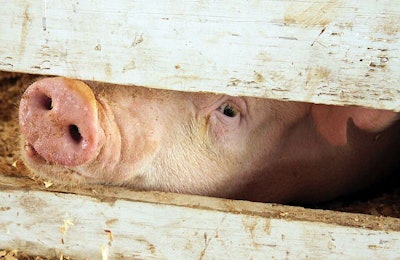
Pandemics affect animals too, but they are called panzootics. An ongoing panzootic affecting pigs could soon reach the United States. If African swine fever (ASF) infects U.S. pigs, American Feed Industry Association (AFIA) analysts believe losses could exceed US$2 billion. Existing export/import treaties with China, Mexico and other U.S. trading partners would need to be renegotiated. Dog, cat and other pet food exports could be slowed or stopped. International trade treaties restrict pet food exports from nations with ASF, not just items made with pig-based ingredients.
“The main AFIA concern with the export of these products as it pertains to an ASF outbreak is that all animal-based products, even the ones with porcine ingredients, would be prohibited due to the fact that:
1) the VS 16-4 certificate language currently prohibits almost all U.S. animal-based products from being exported in the event of an ASF outbreak, and
2) the majority of these products are processed to the extent that it destroys ASF,” Gina Tumbarello, AFIA’s senior director of international policy and trade, told Petfood Industry in an email.
“The USDA’s 16-4 certificate language is antiquated and has ramifications beyond just ASF, such as other diseases listed on the certificate that under a number of circumstances would limit our industry’s ability to export. This document either needs to be updated or discontinued altogether.”
China already had a massive ASF outbreak that devastated the nations’ swine farms, starting in 2018. For pet food companies to continue export to China, it will depend on China keeping its market open for U.S. pet food products and on the U.S. and China negotiating on the United States’ changes to its 16-4 export certificate for animal products, she said.
“The U.S. will need to obtain written approval from Mexico of the ASF protection zones,” Tumbarello said. “As of now, only Canada has provided written approval to the U.S. of its protection zones. The U.S. will also have to negotiate with Mexico on U.S. changes to its VS 16-4 export certificate for animal products.
“It is imperative for those involved in the manufacture of pet food to get involved in advocating for the removal of the 16-4 language or the certificate altogether to avoid unnecessary and long-term trade disruptions in the event of an ASF outbreak,” she said. “Our industry depends on exports and we must work to resolve this issue now to avoid long-term economic ramifications and potential market losses before it is too late.”
History of African swine fever
African swine fever exists naturally in warthogs, bushpigs and a certain tick in Africa, forming a reinfection cycle that doesn’t harm the wild pigs. In 1907, European colonists noted the first instance of African swine fever in their imported domestic pigs, when the livestock died rapidly with fevers and internal bleeding. ASF causes hemorrhaging and high temperatures that can kill a pig within a week of infection. There is no treatment or prevention. Often whole pig herds are slaughtered to eradicate the potential for disease spread in a nation. The ASF virus survives on products, clothes, vehicles and other surfaces, allowing the disease to spread to swine from items with no pig-based ingredients.
The ASF virus has appeared sporadically since leaving Africa, particularly in the Caribbean, Eastern Europe and East Asia. In Eastern Europe, wild boar became a reservoir for the disease. In the first year of an ASF outbreak in China in 2018, approximately 43.46 million pigs died due to African swine fever or culling. Scientists published that figure and an analysis of other economic losses to China by the ASF outbreak from 2018 to 2019 in Nature Food. Recently, the virus spread to the Dominican Republic and Haiti, increasing the likelihood that ASF could reach the U.S.
However, ASF is not a threat to human health and cannot be transmitted from pigs to humans, according to the U.S. Department of Agriculture’s Animal and Plant Health Inspection Service. The virus is not a food safety issue either.

















